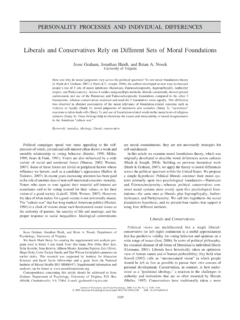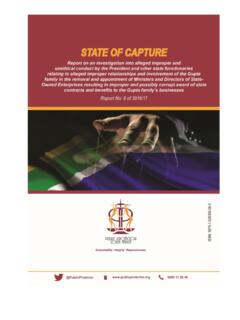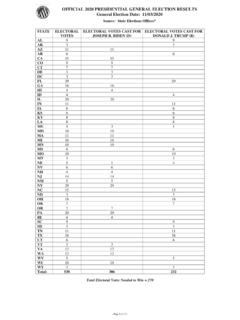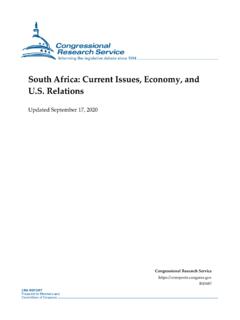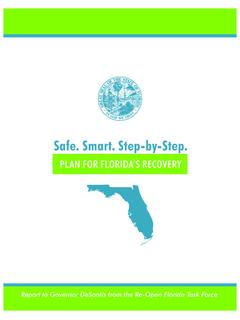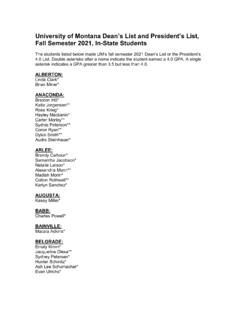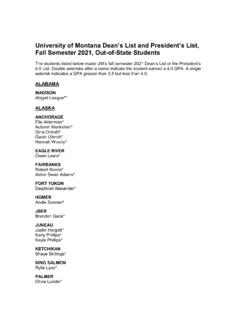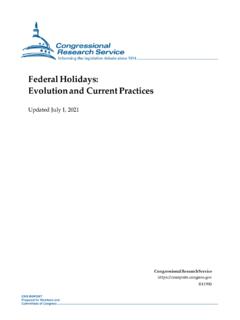Transcription of The concept of power - University of North Carolina at ...
1 THE concept OF power by Robert A. Dahl Department oj Political Science, Yale University What is power ? Most people have an intuitive notion of what it means. But scientists have not yet formulated a statement of the concept of power that is rigorous enough to be of use in the sys- tematic study of this important social phenomenon. power is here defined in terms of a relation between people, and is expressed in simple symbolic notation. From this definition is developed a statement of power comparability, or the relative degree of power held by two or more persons. With these concepts it is possible for example, to rank members of the United States Senate according to their power over legislation on foreign policy and on tax and fiscal policy. HAT some people have more power than T others is one of the most palpable facts of human existence. Because of this, the concept of power is as ancient and ubiquitous as any that social theory can boast. If these assertions needed any documentation, one could set up an endless parade of great names from Plato and Aristotle through Machiavelli and Hobbes to Pareto and Weber to demonstrate that a large number of seminal social theorists have devoted a good deal of attention to power and the phenomena associated with it.
2 Doubtless it would be easy to show, too, how the word and its synonyms are evcrywhere embedded in the languagc of civilized peoples, often in subtly different ways: power , influence, con- trol, pouvoir, puissance, Macht, Herrschaft, Gewalt, imperium, potestas, auctoritas, potentia, etr. I shall spare the reader the fruits and myself the labor of such a demonstration. Reflecting on the appeal to authority that might be made does, however, arouse two suspicions: First (following the axiom that where there is smoke there is fire), if so many people at so many different times have felt the need to attach the label power , or something like it, to some Thing they be- lieve they have observed, one is tempted to suppose that the Thing must exist; and not only exist, but exist in a form capable of being studied more or less systematically. The second and more cynical suspicion is that a Thing to which people attach many labels with subtly or grossly different mean- ings in many different cultures and times is probably not a Thing at all but many Things; there are students of the subject, although I do not recall any who have had the temerity to say so in print, who think that because of this the whole study of power is a bottomless swamp.
3 Paradoxical as it may sound, it is probably too early to know whether these critics are right. For, curiously enough, the systematic study of power is very recent, precisely be- cause it is only lately that serious attempts have been made to formulate the concept rigorously enough for systematic study. If we take as our criterion for the efficiency of a scientific concept its usability in a theo- retical system that possesses a high degree By dernonst,rating the importance of concepts such as power and influence, particularly in po- litical analysin, and by insisting upon rigorous conceptual clarity, Harold TAasswell has had a seminal influence. Cf. especially Reference 3. A similar approach will be found in References 6, 7, 8, 10. For the approach of the present article I owe a particularly heavy debt to March, with whom I had countlesR profitable discussions during a year we both spent as fellows at the Center for Ad- vanced Study in the Behavioral Sciences.
4 I have drawn not only on our joint work but on his own published and unpublished writings on the 201 202 ROBERT A. DAHL of systematic and empirical import, then we simply cannot say whether rigorous defi- nitions of the concept of power are likely to be useful in theoretical systems with a relatively large pay-off in the hard coin of scientific understanding. The evidence is not yet in. I think it can be shown, however, that to define the concept power in a way that seems to catch the central intuitively under- stood meaning of the word must inevitably result in a formal definition that is not easy to apply in concrete research problems; and therefore, operational equivalents of the formal definition, designed to meet the needs of a particular research problem, are likely to diverge from one another in im- portant ways. Thus we are not likely to producecertainly not for some consider- able time to comeanything like a single, consistent, coherent Theory of power .
5 We are much more likely to produce a variety of theories of limited scope, each of which employs some definition of power that is useful in the context of the particular piece of research or theory but different in important respects from the definitions of other studies. Thus we may never get through the swamp. But it looks as if we might someday get around it. With this in mind, I propose first to essay a formal definition of power that will, I hope, catch something of one s intuitive notions as to what the Thing is. By formal I mean that the definition will presuppose the existence of observations of a kind that may not always or even frequently be possible. Second, I should like to indicate how operational definitions have been or might be modelled on the formal one for subject. The comments of jacob Marschak on this paper have also been most helpful. There are, of course, approaches radically different from the one employed here and in the works mentioned above.
6 John R. P. French, Jr. (2), has developed a model that assumes a unidimensional continuum of opinion which can be measured with a ratio scale, and he defines the power of A over B (with respect to a given opinion) [to be] equal to the maximum force which A can induce on B minus the maximum resisting force which B can mobilize in the opposite direction. Game theory provides still another approach. Cf. References 4, 5, 9. some specific purposes, and the actual or possible results of these operational d, ti- nitions. I should like to be permitted one liberty. There is a long and honorable history at- tached to such words as power , influence, control, and authority. For a great many purposes, it is highly important that a distinction should be made among them; thus to Max Weber, Herrschaft ist.. , ein Sonderfall urn Macht, Authority is a special case of the first, and Legitimate Authority a subtype of cardinal significance (11). In this essay I am seeking to explicate the primitive notion that seems to lie behind all of these concepts.
7 Some of my readers would doubtless prefer the term ( influence, while others may insist that I am talking about control. I should like to be permitted to use these terms interchangeably when it is convenient to do so, without denying or seeming to deny that for many other purposes distinctions are necessary and useful. Unfortunately, in the English lan- guage power is an awkward word, for unlike influence and control it has no con- venient verb form, nor can the subject and object of the relation be supplied with noun forms without resort to barbaric neologisms. power AS A RELATION AMONG PEOPLE What is the intuitive idea we are trying to capture? Suppose I stand on a street corner and say to myself, I command all automobile drivers on this street to drive on the right side of the road ; suppose further that all the drivers actually do as I command them to do; still, most people will regard me as mentally ill if I insist that I have enough power over automobile drivers to compel them to use the right side of the road.)
8 On the other hand, suppose a policeman is standing in the middle of an intersection at which most traffic ordinarily moves ahead; he orders all traffic to turn right or left; the traffic moves as he orders it to do. Then it accords with what I con- ceive to be the bedrock idea of power to say that the policeman acting in this particu- lar role evidently has the power to make automobile drivers turn right or left rather than go ahead. My intuitive idea of power , then, is something like this: A has power concept OF power 203 over B to the extent that he can get B to do homething that B would not otherwise do. If Hume and his intellec%ual successors had never existed, the distinction between the two events above might be firmer than it, is. But anyone who sees in the two cases the need to distinguish mere association from causc will realize that the attempt to define power could push us into some messy epistemological problems that do not semi to havc any generally accepted so- lutions at the moment.
9 I shall therefore quite deliberately stccr dear of the possible identity of power with cause, and the host of problems this identity might give rise to. Let us proceed in a different way. First, let 11s agree that power is a relation, and that it is a relatioii among people. Although in common speech the term encompasses re- lations among people and other animate or inanimate objects, we shall have our hands full if we confiiie the relationship to humaii beings. All of the social theory I mentioned earlicr is interesting only when it deals with this liniitcd kind of relationship. Let us call the objects in the relationship of power , actors. Actors may be individuals, groups, roles, ofices, governments, nation-states, or other human aggregates. To specify the actors in a power relatioii- A has power over R-is not very interesting, informative, or even accurate. Although the statement that the president has (some) power over Congress is not empty, neither is it very useful.
10 A much more complete statement would include references to (a) the source, domain, or base of the president s power over Congress; (1)) the means or iiistrunieiits uhed by the president to exert power over Congress; (c) the amount or extent of his powr over Congress; and (d) the range or scopc of his power over Congress. The base of an avtor s power consists of all the rc~sources- -opportunities, acts, objects, he can exploit in order to effect thc behavior of another. Much of the best writing on power -Bertrand Russell is a good example-consists of an examination of the possible bases of power . A study of the war potential of nations is also a study of the hses of power . t5ome of the possible bases of u Presidelit s power over a Senator are his patronage, his constitutional veto, the possibility of calling White House con- ferences, his influence with the national electorate, his charisma, his charm, and the like. In a sense, the base is inert, passive.
